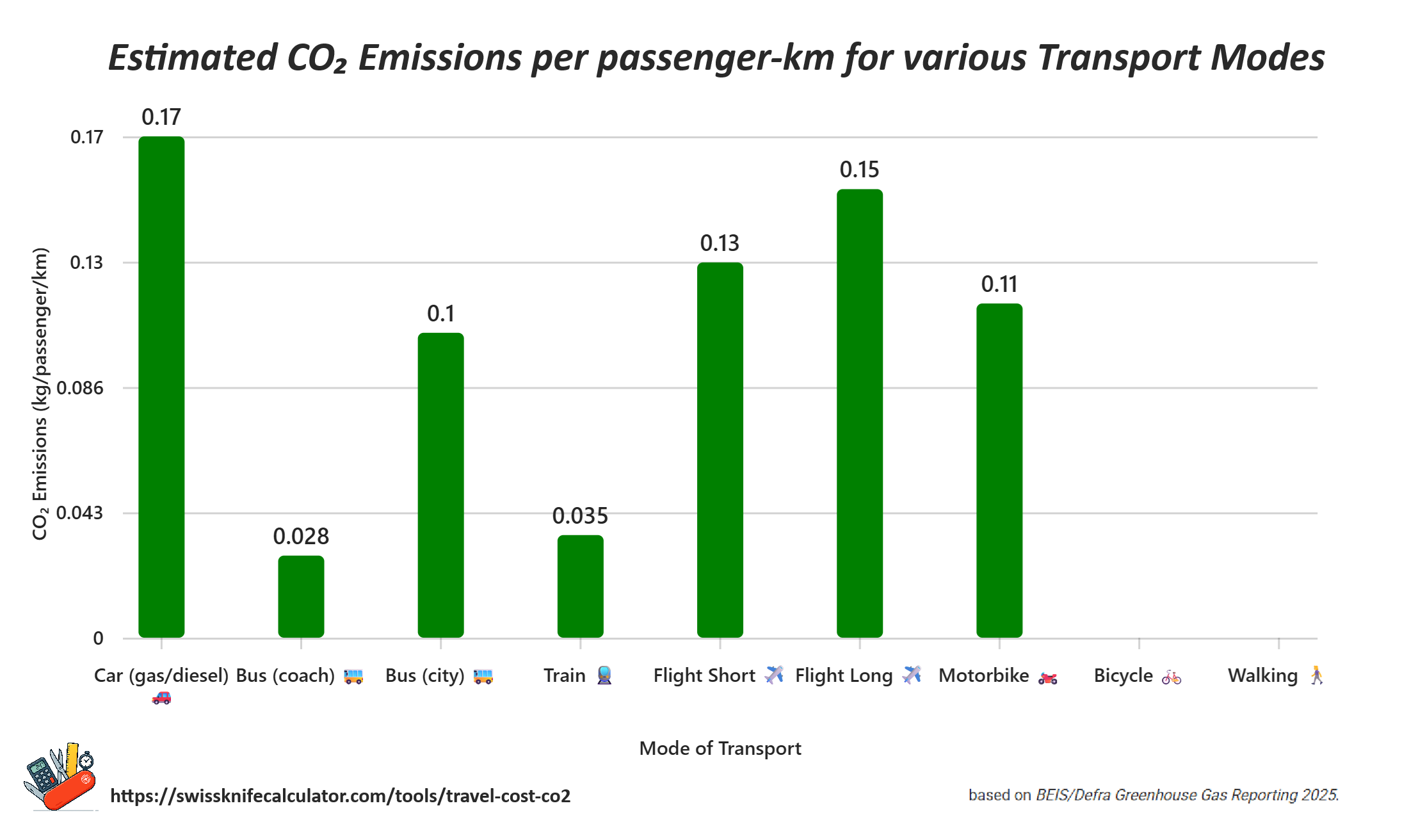
Travel Cost, CO₂ & Time Calculator – Car vs EV, Train, Bus, Flight
Instantly compare trip cost, CO₂ footprint, and travel time across car, EV, bus, train, flight, and more. Includes per-person split, extras like tolls & lodging, and share/export options.
🧭 Overview
The Travel Cost, CO₂ & Time Calculator helps you instantly compare the cost, carbon footprint, and duration of trips across different transport modes — including Car, Electric Vehicle (EV), Train, Bus, Flight, Motorbike, E-Bike, Bicycle, and Walking.
Enter the distance of your journey, fuel or energy efficiency (L/100km, mpg, kWh/100km), local fuel or electricity prices, and extras such as tolls, parking, or lodging. The calculator shows total trip cost, per-person split, CO₂ emissions in kilograms, tree-equivalent offsets, and estimated travel time. You can adjust for carpooling, bus type (coach vs city), and short vs long-haul flights. Results can be shared via link, printed, or exported for easy trip planning.
If you only need a quick calculation, check our Fuel Cost Calculator for single trips, or our CO₂ Emission Calculator for standalone emission checks.
⚙️ How It Works
- Distance: Enter in km or miles (automatically converted internally).
- Car: Calculates liters of fuel used (L/100km or mpg), cost from fuel price, and CO₂ from per-km vehicle factor ÷ carpoolers.
- EV: Calculates kWh consumed (kWh/100km), cost using your electricity rate, and CO₂ from grid factor ÷ passengers.
- Bus: Enter ticket price and select Coach or City Bus. CO₂ factors differ.
- Train / Flight: Enter ticket prices; CO₂ uses per-passenger-km factors with short/long-haul toggle for flights.
- Motorbike: Works like cars, with optional rider-per-bike sharing.
- Bicycle / Walking: Assumes near-zero operational CO₂; you may add misc. cost per person if desired.
- Time: Calculated as distance ÷ average speed, with flight overhead included.
- Extras: Add tolls, parking, or lodging (nights × rate). You decide which modes they apply to.
- Output: Shows totals, per-person splits, CO₂ in kg, tree equivalents, and duration (HH:MM).
🧮 Formulas
| Mode | Energy/Fuel | Cost | CO₂ | Time |
|---|---|---|---|---|
| Car | L = distance × (L/100km) / 100 | Fuel cost = L × price/L (or $/gal ÷ 3.78541) | CO₂ total = distance × factor_car × vehicles; per-person = ÷ passengers | Time = distance ÷ avg_speed |
| EV | kWh = distance × (kWh/100km) / 100 | Cost = kWh × price/kWh | CO₂ = kWh × grid_factor ÷ passengers | Time = distance ÷ avg_speed |
| Bus | — | Ticket × passengers | CO₂ = distance × factor_bus × passengers | Time = distance ÷ avg_speed |
| Train | — | Ticket × passengers | CO₂ per person = distance × factor_train | Time = distance ÷ avg_speed |
| Flight | — | Ticket × passengers | CO₂ per person = distance × factor_flight | Time = distance ÷ cruise_speed + overhead |
Conversions: 1 mi = 1.60934 km; 1 gal = 3.78541 L; US mpg → L/100km via 235.215 ÷ mpg.
📏 Defaults & Assumptions
- Car CO₂ default: 0.171 kg/km per vehicle (÷ carpoolers for per-person).
- EV Grid factor: 0.35 kg/kWh (change based on your country’s electricity mix).
- Train: 0.0354 kg/pkm (average electric rail).
- Flight: 0.127 kg/pkm short-haul; 0.152 kg/pkm long-haul with 2.5h average overhead.
- Bus: Coach ~0.0277 kg/pkm; City Bus ~0.100–0.140 kg/pkm.
- Motorbike: ~0.113 kg/pkm default.
- Bicycle / Walking: Operational CO₂ near zero; food-related emissions not included.
- Tree equivalence: One tree absorbs ~22 kg CO₂/year.
📊 Emissions from Different Modes of Transport
The chart below shows the estimated CO₂ emissions per passenger-km for various transport modes based on BEIS/Defra Greenhouse Gas Reporting 2025.
📷 View static infographic version

🧪 Example
Scenario: A 300 km trip with 4 passengers. Car: 7.5 L/100km, fuel $1.80/L, factor=0.171. EV: 18 kWh/100km, $0.30/kWh, grid=0.35. Train ticket $40 each. Flight ticket $120 each (short-haul). Bus ticket $25 each.
- Car: 22.5 L fuel → $40.5. CO₂ total 51.3 kg → 12.8 kg per person. Time ~3h45m at 80 km/h.
- EV: 54 kWh → $16.2. CO₂ total 18.9 kg → 4.7 kg per person. Time ~3h45m at 80 km/h.
- Train: $160 total tickets. CO₂ total ~49.2 kg. Time ~2h30m at 120 km/h.
- Flight: $480 total. CO₂ ~306 kg. Time ~2h (750 km/h + 2h overhead).
- Bus: $100 total. CO₂ ~34.5 kg. Time ~4h15m at 70 km/h.
With 4 people, the EV is the cheapest and lowest-carbon option, but the train is faster.
🧩 Popular Use Cases
- Plan a road trip budget including tolls, parking, and lodging nights split among passengers.
- Compare EV vs petrol car costs for long-distance travel.
- Evaluate flight vs train vs bus for short-haul travel.
- Check the carbon footprint of commuting by carpool, bus, e-bike, or train.
- Estimate family holiday expenses across different travel modes.
- Create a business trip report with CO₂ and cost per participant.
❓ Frequently Asked Questions (FAQ)
How is travel time calculated?
For each mode, time = distance ÷ average speed. Flights add an overhead (boarding, security, etc.) set at 2.0h for short-haul and 2.5h for long-haul.
What’s the difference between passengers and carpoolers?
Passengers split total cost (tickets, fuel, extras). Carpoolers split vehicle CO₂. Example: 4 passengers in 2 cars → costs split by 4, but CO₂ is per car, so higher than all 4 in one vehicle.
Why does EV sometimes have higher CO₂ than a petrol car?
It depends on your electricity grid. In coal-heavy grids, EVs may have higher emissions. Change the grid factor to match your region for accurate results.
Does the calculator include food emissions for walking or cycling?
No. Operational emissions are near zero, but additional calorie intake could add indirect CO₂. We focus on operational travel emissions only.
What’s the difference between coach and city bus?
Coach buses are long-distance with higher occupancy and lower emissions per km (~0.097 kg/pkm). City buses have more stops and lower occupancy, averaging ~0.120–0.140 kg/pkm.
How do I include hotel or lodging costs?
Enter nights × nightly rate under “Lodging”. Apply it to relevant modes (Car, EV, etc.) with the checkboxes.
What’s the tree equivalent column?
It shows how many trees would need to absorb the CO₂ from your trip in one year. Example: if your trip emits 44 kg CO₂, it equals ~2 trees (at 22 kg/tree/year).
Can I compare only cost or only CO₂?
Yes. Use the View toggle above results to switch between Cost, CO₂, Time, or All modes.
How do I share my results?
Click “Share Link”. A unique URL is copied to your clipboard, which saves your inputs. Anyone can open it and see the same scenario.
Are ticket prices included automatically?
No, you must enter ticket prices for train, flight, or bus travel. This allows flexibility across different regions and providers.
Can I use imperial mpg instead of US mpg?
Currently the calculator uses US mpg (235.215 ÷ mpg). If you use imperial mpg, results will be slightly off. You can instead enter L/100km directly for accuracy.
📚 Data Sources
- DEFRA/BEIS (UK Government): Official greenhouse gas conversion factors for company reporting 2025 (source).
- ICCT (International Council on Clean Transportation): Research-based emission factors for transport modes (source).
- OWID (Our World in Data): Aggregated datasets on CO₂ emissions and energy intensity (source).
These sources provide global averages. Real-world values vary by route, vehicle, load, and energy mix.
⚠️ Important Disclaimer
This calculator provides estimates only. Fuel prices, ticket costs, CO₂ factors, and travel times vary by region, season, and operator. Always verify important numbers with official transport providers, government data, or energy suppliers before making financial or environmental decisions.